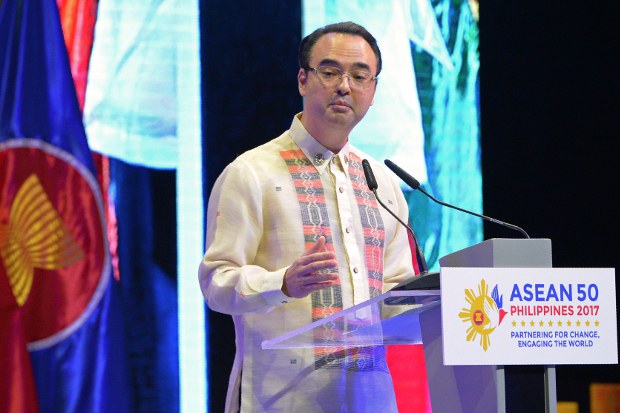10,000 Filipinos Could Face Deportation from United States
2017.09.06
Manila
 Philippine Foreign Affairs Secretary Alan Peter Cayetano speaks during the closing ceremony of the 50th Association of Southeast Asian Nations regional security forum in Manila, Aug. 8, 2017.
Philippine Foreign Affairs Secretary Alan Peter Cayetano speaks during the closing ceremony of the 50th Association of Southeast Asian Nations regional security forum in Manila, Aug. 8, 2017.
The Philippine government on Wednesday said about 10,000 Filipinos could be deported from the United States as a result of President Donald Trump’s decision to end a program that had allowed undocumented immigrant children to stay there legally.
Foreign Secretary Alan Peter Cayetano said he was authorizing the use of special funds to “assist immigration-related cases” including those that would arise from Trump’s decision to revoke the Deferred Action on Childhood Arrivals, otherwise known as DACA.
On Tuesday, Trump said he was revoking the program and gave the U.S. Congress until March 2018 to pass legislation that would effectively prevent the deportations of as many as 800,000 people covered by the program.
Of the estimated 3.4 million Filipinos living and working in the U.S., about 310,000 are undocumented, according to the Philippines Department of Foreign Affairs.
Of those, approximately 10,000 qualified for DACA because they entered the U.S. prior to their 16th birthday and before 2007, and were students, high school graduates, honorably discharged from the military, not convicted of a crime or considered a threat to national security.
Cayetano called on Filipino citizens who would be affected by the decision to remain hopeful even as he called on them to prepare themselves for any eventuality.
“While we hope for the best in the form of a legislative solution, those affected should likewise prepare for the worst,” he said.
“In any event, we are ready to welcome and assist our compatriots in whatever way we can if they are returned to the Philippines,” he said.
Former U.S. President Barack Obama issued an executive order on DACA in 2012 in an effort to protect children of undocumented immigrants from being deported.
The program provided temporary legal status that allowed qualified undocumented immigrant children from the Philippines, and other countries, to stay, study and work in the United States.







